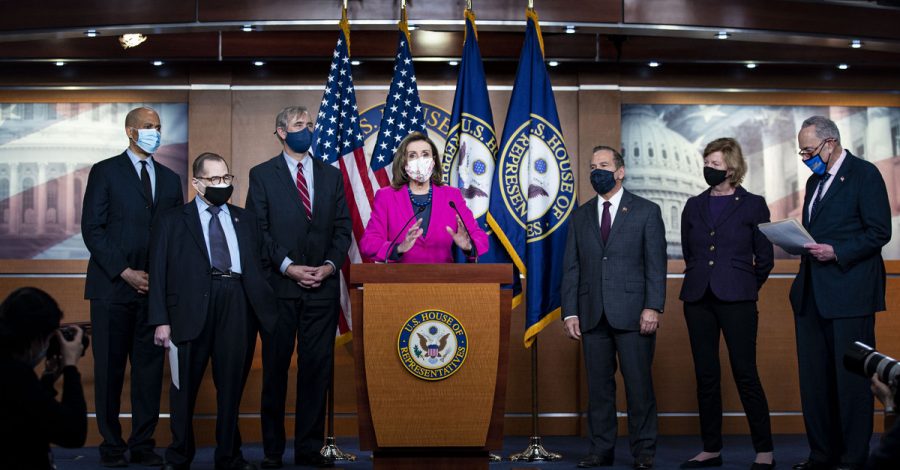LGBTQ+ students, allies hail passage of H.R. 5
H.R. 5, the Equality Act, would extend civil rights protections to millions of LGBTQ+ Americans
Democrats in Congress advanced H.R. 5, otherwise known as the Equality Act, last month. It now faces a difficult road in the Senate, where current rules require 60 votes for passage.
March 18, 2021
Step outside of Wake Forest’s campus gates and you may not receive just treatment, at least if you belong to the Lesbian, Gay, Bisexual, Trans, Queer and beyond (LGBTQ+) community, as per North Carolina anti-discrimination laws.
“As a queer non-binary person, I think about what will happen if I’m on vacation and need to go to the hospital, but the doctor doesn’t want to treat me,” said A.J Mazaris, director of the LGBTQ Center at Wake Forest.
As a white, upper-middle-class person, Mazaris recognized their relative privilege and expressed the need to create safety networks for LGBTQ+ people of color.
The Equality Act (H. R. 5) was recently passed by the House of Representatives and would extend the Civil Rights Act of 1964 to prohibit discrimination based on gender identity and sexual orientation in areas including employment, education, housing, public spaces and jury service. If passed in the Senate, this act would recognize the rights of the LGBTQ+ community at the federal level, getting rid of the varied state laws currently in place.
Whether the bill passes the Senate depends almost entirely on the fate of the filibuster rule, which requires 60 of 100 senators to agree to vote on a bill before it can move forward, according to John Dinan, professor of politics and international affairs.
“It is highly unlikely that there are currently 60 senators willing to support this legislation — hence, it is unlikely to pass if the filibuster rule is maintained,” he said.
While it may not become law, for many students, the Equality Act is symbolic.
“As a bisexual individual, it means a lot to me that LGBTQ+ rights are being discussed in the government,” said an anonymous sophomore. “The fact that leaders are pushing this law sends a positive message to Gen-Z, which is passionate about social issues.”
College Republicans President Elizabeth Whitehurst, a junior who identifies as a Christian, agrees with the overall premise of treating all citizens equally. However, she believes that the Equality Act infringes on religious freedoms granted by the Religious Freedoms Restoration Act (RFRA).
“Doctors might have to perform sex-change operations even if that goes against their religious beliefs,” Whitehurst said.
According to Assistant Professor of Women’s Gender and Sexuality Studies Rachel Corbman, using the RFRA argument oversimplifies this issue by assuming that the rights of religious people always go against the rights of the LGBTQ+ community and vice-versa.
“Not all religious people are homophobic and not all LGBTQ+ [people] are atheist,” she said.
Myles Cyrus, a sophomore who identifies as a Baptist and an ally of the LGBTQ+ community, also supports the Equality Act. According to him, religion should not be used as an excuse to discriminate.
“Christianity encourages love for all people, [so] why are we so intolerant of someone on the grounds of being who they are or loving who they love?” he asked.
The United States has a history that enshrines the separation of church and state, so it is questionable to promote hate in the name of RFRA, according to an anonymous sophomore.
“The Old Testament defends slavery, but we still have the 13th Amendment,” they said. “It is about what we value as a society, not what a scripture prescribes.”
They went to a Catholic high school in their home state that was not very accepting of their identity as an LGBTQ+ person. Now in college, he experiences the opposite. He believes Wake Forest is a liberal, accepting bubble in North Carolina, which he views as a relatively conservative, unaccepting state.
Mazaris believes that there is a need to untangle the equality that the American constitution theoretically guarantees. In their opinion, there are contested notions about what it means to be American and what ideas should govern the understanding of gender and sexuality.
“We will continue this ping pong of executive orders and bills like the Equality Act as new governments change,” Mazaris said. “But the question of rights is not going to go away.”














